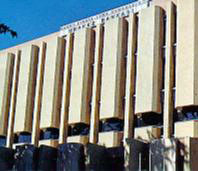| |
 |
|
Central
Bank of North Cyprus |
The Central
Bank of the TRNC
emulates the functions of a central bank but the scope of its activities is
limited. Because the Turkish Lira is the medium of exchange it does not print
money. Neither can it set monetary policy. It receives daily exchange rates from
the Central Bank of Turkey and passes these onto the commercial banks but has no
means of influencing the rates, as the banks are free to set these up to the
given interest rate ceiling.
Commercial banks are required to keep on reserve with the Central Bank 15% of
their Turkish Lira deposits and 15% of their foreign currency holdings, and must
further keep 10% cash availabilities. The Central Bank is the banker for the
government. It holds aid money provided by Turkey and earns its profit by
placing it on deposit in Turkey and elsewhere. Foreign exchange holdings are
deposited abroad, largely in the UK until recently. After the collapse of Polly
Peck International, the Central Banks foreign exchange holdings in the UK were
frozen by an injunction. This was overturned on appeal and the funds deposited
elsewhere -mostly in Turkey.
Commercial lending rates are 10-30% above the rate of inflation. The authorities
operate a system of preferential lending for approved investments. The Central
Bank rebates the difference to the commercial banks using its own profits and
aid funds from Turkey. The Central Bank lending to the government is interest-
free. The Central Bank also supervises both onshore and offshore commercial
banks. There has been a rush to open both during recent years and there are now
21 onshore banks, and some 30 offshore banks. Offshore banks do not have to
maintain the reserves that the onshore commercial banks do and therefore can
offer a higher rate of interest on deposits. This is not subject to income tax.
During the economic crisis in Turkey in the spring of 1994, two TRNC registered
banks collapsed. They were Mediterranean Guarantee Bank (which has
later been bailed by the government), and Everest Bank. |









